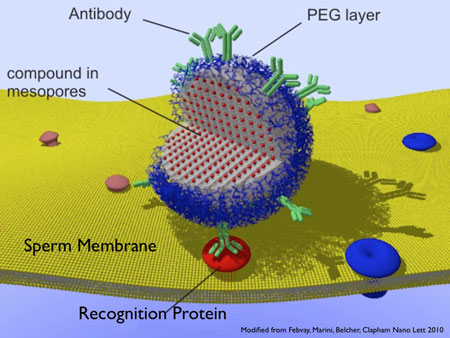| Apr 07, 2011 |
Nanoparticle-based contraceptive makes sperm impotent
|
|
(Nanowerk News) It's found only in the tails of sperm. It takes seven genes to build it. It gets activated as the sperm gets closer to the egg, giving it that extra whip and thrust to make it across the finish line.
|
|
David Clapham, its discoverer, named it CatSper. Blocking it could literally make sperm impotent. This could be the basis of a new contraceptive gel or a pill that could be used by men or women.
|
|
And that's of interest to the Bill & Melinda Gates Foundation. With the world's population projected to reach 7 billion this year, the Foundation is looking for new contraceptive technologies that work well in developing-world settings. Condom usage is pretty low, around 17 percent. Existing spermicides cause irritation – and that increases the risk of sexually transmitted diseases, including HIV.
|
|
CatSper is part of a family of intricately folded, gate-like proteins called ion channels, which straddle the surface of every cell, allowing electrically charged particles in and out, influencing a variety of cellular functions. In CatSper's case, the particles are calcium ions that turbocharge the tail's motor proteins.
|
|
Funded by Gates and the National Institutes of Health, and working with a screening center in Minnesota, Clapham's team is doing large-scale assays challenging sperm with different compounds that might plug CatSper up, depriving sperm of that last-minute energy boost.
|
|
Compounds that make the cut would be loaded into nanoparticles developed by Sebastien Febvay, an MIT graduate student in Clapham's lab, and Davide Marini, an MIT-trained bioengineer who did his postdoctoral fellowship in Clapham's lab. The particles would be coated with antibodies (shown in green below) that are attracted to specific sperm "recognition" proteins (like the one shown in red here), guiding them to their target.
|
 |
|
They'd then release their compounds right where they're needed, rather than dead-ending in mucus or on the vaginal wall.
|
|
If sperm are the missiles, the nanoparticles are the smart bombs.
|
|
"Twenty million of these missiles are released at once, and you have to get all of them before they make it to the target," says Clapham, who's also a Howard Hughes Medical Institute investigator and the scientific co-founder of Hydra Biosciences, which has an active ion-channel program. "It's an anti-missile device that doesn't cause any collateral damage."
|
|
Release could be accomplished in various ways, perhaps by taking advantage of the same natural triggers that stimulate CatSper itself — the alkaline conditions around the egg or the release of progesterone by a layer of cells surrounding the egg. Or maybe even the prostatic fluid could block the mobility of the sperm it's carrying (how cruel is that?).
|
|
Clapham's team has 18 months to continue screening compounds and develop an initial prototype, and then could apply for as much as $1M from Gates to test it in animal models. They're also interested in developing an oral CatSper blocker that could be taken by either men or women around the time of sexual activity.
|

